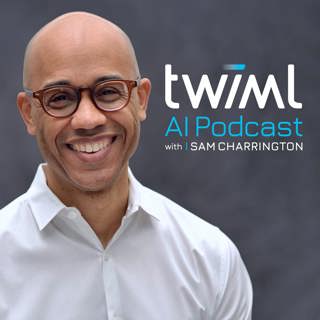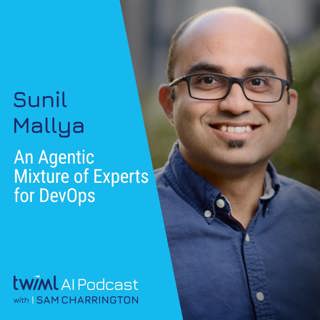
An Agentic Mixture of Experts for DevOps with Sunil Mallya - #708
Today we're joined by Sunil Mallya, CTO and co-founder of Flip AI. We discuss Flip’s incident debugging system for DevOps, which was built using a custom mixture of experts (MoE) large language model (LLM) trained on a novel "CoMELT" observability dataset which combines traditional MELT data—metrics, events, logs, and traces—with code to efficiently identify root failure causes in complex software systems. We discuss the challenges of integrating time-series data with LLMs and their multi-decoder architecture designed for this purpose. Sunil describes their system's agent-based design, focusing on clear roles and boundaries to ensure reliability. We examine their "chaos gym," a reinforcement learning environment used for testing and improving the system's robustness. Finally, we discuss the practical considerations of deploying such a system at scale in diverse environments and much more. The complete show notes for this episode can be found at https://twimlai.com/go/708.
4 Nov 20241h 15min
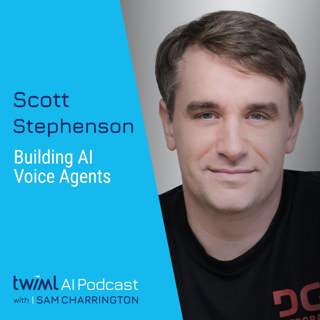
Building AI Voice Agents with Scott Stephenson - #707
Today, we're joined by Scott Stephenson, co-founder and CEO of Deepgram to discuss voice AI agents. We explore the importance of perception, understanding, and interaction and how these key components work together in building intelligent AI voice agents. We discuss the role of multimodal LLMs as well as speech-to-text and text-to-speech models in building AI voice agents, and dig into the benefits and limitations of text-based approaches to voice interactions. We dig into what’s required to deliver real-time voice interactions and the promise of closed-loop, continuously improving, federated learning agents. Finally, Scott shares practical applications of AI voice agents at Deepgram and provides an overview of their newly released agent toolkit. The complete show notes for this episode can be found at https://twimlai.com/go/707.
28 Okt 20241h 1min
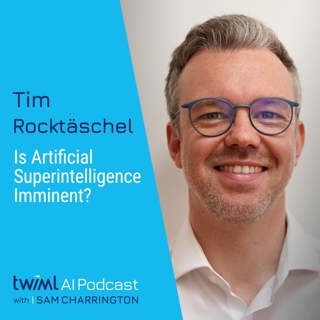
Is Artificial Superintelligence Imminent? with Tim Rocktäschel - #706
Today, we're joined by Tim Rocktäschel, senior staff research scientist at Google DeepMind, professor of Artificial Intelligence at University College London, and author of the recently published popular science book, “Artificial Intelligence: 10 Things You Should Know.” We dig into the attainability of artificial superintelligence and the path to achieving generalized superhuman capabilities across multiple domains. We discuss the importance of open-endedness in developing autonomous and self-improving systems, as well as the role of evolutionary approaches and algorithms. Additionally, we cover Tim’s recent research projects such as “Promptbreeder,” “Debating with More Persuasive LLMs Leads to More Truthful Answers,” and more. The complete show notes for this episode can be found at https://twimlai.com/go/706.
21 Okt 202455min

ML Models for Safety-Critical Systems with Lucas García - #705
Today, we're joined by Lucas García, principal product manager for deep learning at MathWorks to discuss incorporating ML models into safety-critical systems. We begin by exploring the critical role of verification and validation (V&V) in these applications. We review the popular V-model for engineering critical systems and then dig into the “W” adaptation that’s been proposed for incorporating ML models. Next, we discuss the complexities of applying deep learning neural networks in safety-critical applications using the aviation industry as an example, and talk through the importance of factors such as data quality, model stability, robustness, interpretability, and accuracy. We also explore formal verification methods, abstract transformer layers, transformer-based architectures, and the application of various software testing techniques. Lucas also introduces the field of constrained deep learning and convex neural networks and its benefits and trade-offs. The complete show notes for this episode can be found at https://twimlai.com/go/705.
14 Okt 20241h 16min
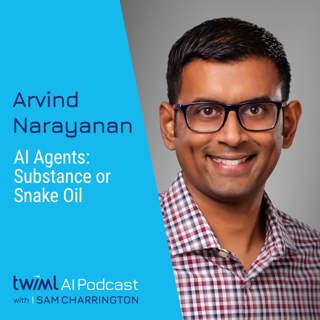
AI Agents: Substance or Snake Oil with Arvind Narayanan - #704
Today, we're joined by Arvind Narayanan, professor of Computer Science at Princeton University to discuss his recent works, AI Agents That Matter and AI Snake Oil. In “AI Agents That Matter”, we explore the range of agentic behaviors, the challenges in benchmarking agents, and the ‘capability and reliability gap’, which creates risks when deploying AI agents in real-world applications. We also discuss the importance of verifiers as a technique for safeguarding agent behavior. We then dig into the AI Snake Oil book, which uncovers examples of problematic and overhyped claims in AI. Arvind shares various use cases of failed applications of AI, outlines a taxonomy of AI risks, and shares his insights on AI’s catastrophic risks. Additionally, we also touched on different approaches to LLM-based reasoning, his views on tech policy and regulation, and his work on CORE-Bench, a benchmark designed to measure AI agents' accuracy in computational reproducibility tasks. The complete show notes for this episode can be found at https://twimlai.com/go/704.
7 Okt 202454min
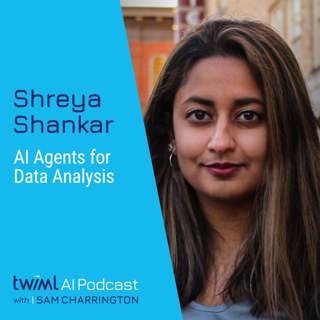
AI Agents for Data Analysis with Shreya Shankar - #703
Today, we're joined by Shreya Shankar, a PhD student at UC Berkeley to discuss DocETL, a declarative system for building and optimizing LLM-powered data processing pipelines for large-scale and complex document analysis tasks. We explore how DocETL's optimizer architecture works, the intricacies of building agentic systems for data processing, the current landscape of benchmarks for data processing tasks, how these differ from reasoning-based benchmarks, and the need for robust evaluation methods for human-in-the-loop LLM workflows. Additionally, Shreya shares real-world applications of DocETL, the importance of effective validation prompts, and building robust and fault-tolerant agentic systems. Lastly, we cover the need for benchmarks tailored to LLM-powered data processing tasks and the future directions for DocETL. The complete show notes for this episode can be found at https://twimlai.com/go/703.
30 Sep 202448min

Stealing Part of a Production Language Model with Nicholas Carlini - #702
Today, we're joined by Nicholas Carlini, research scientist at Google DeepMind to discuss adversarial machine learning and model security, focusing on his 2024 ICML best paper winner, “Stealing part of a production language model.” We dig into this work, which demonstrated the ability to successfully steal the last layer of production language models including ChatGPT and PaLM-2. Nicholas shares the current landscape of AI security research in the age of LLMs, the implications of model stealing, ethical concerns surrounding model privacy, how the attack works, and the significance of the embedding layer in language models. We also discuss the remediation strategies implemented by OpenAI and Google, and the future directions in the field of AI security. Plus, we also cover his other ICML 2024 best paper, “Position: Considerations for Differentially Private Learning with Large-Scale Public Pretraining,” which questions the use and promotion of differential privacy in conjunction with pre-trained models. The complete show notes for this episode can be found at https://twimlai.com/go/702.
23 Sep 20241h 3min

Supercharging Developer Productivity with ChatGPT and Claude with Simon Willison - #701
Today, we're joined by Simon Willison, independent researcher and creator of Datasette to discuss the many ways software developers and engineers can take advantage of large language models (LLMs) to boost their productivity. We dig into Simon’s own workflows and how he uses popular models like ChatGPT and Anthropic’s Claude to write and test hundreds of lines of code while out walking his dog. We review Simon’s favorite prompting and debugging techniques, his strategies for sidestepping the limitations of contemporary models, how he uses Claude’s Artifacts feature for rapid prototyping, his thoughts on the use and impact of vision models, the role he sees for open source models and local LLMs, and much more. The complete show notes for this episode can be found at https://twimlai.com/go/701.
16 Sep 20241h 14min
